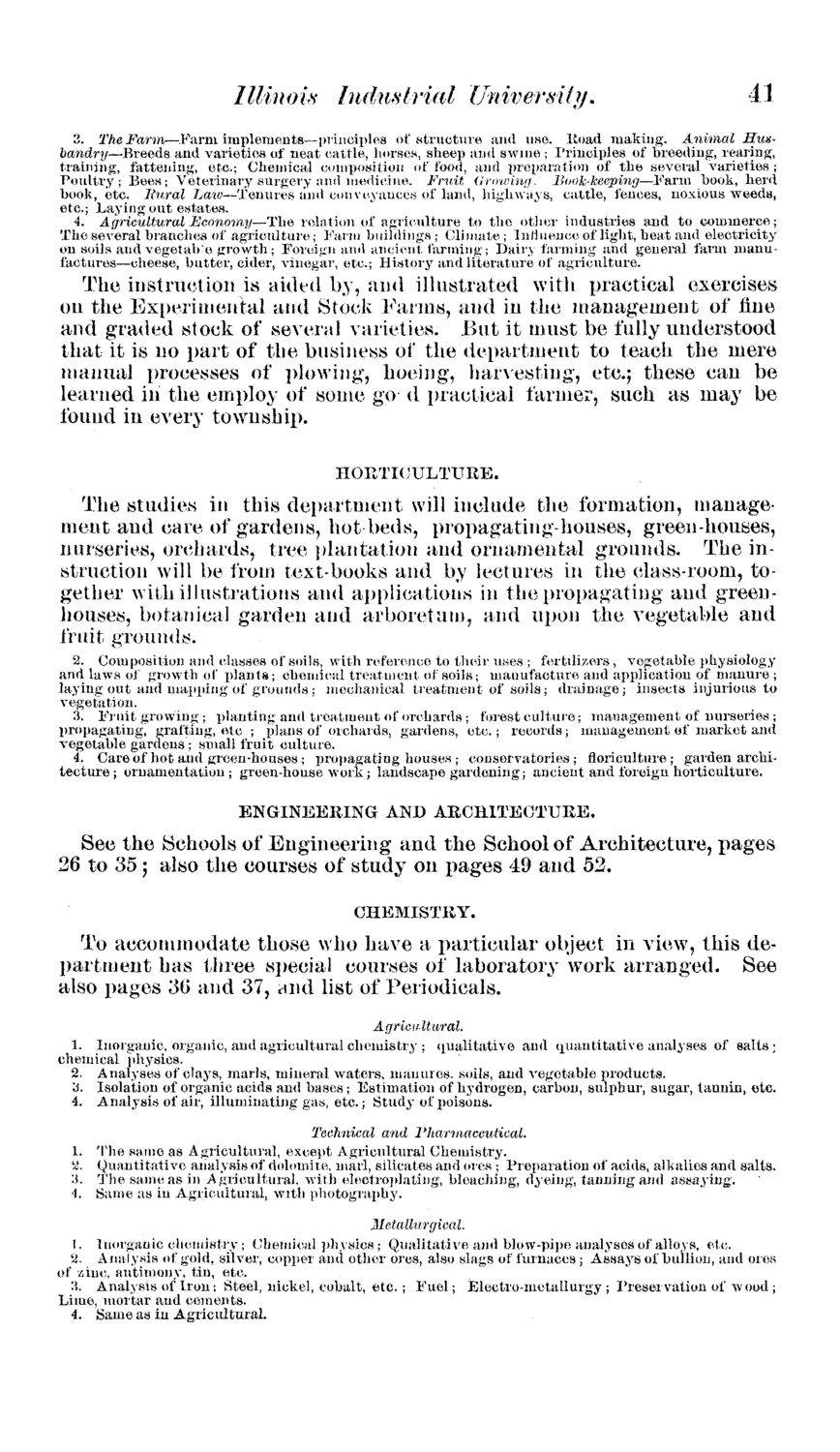| |
| |
Caption: Board of Trustees Minutes - 1874
This is a reduced-resolution page image for fast online browsing.

EXTRACTED TEXT FROM PAGE:
Illinois Industrial University. 41 3. The Farm—Farm implements—principles of structure and use. Koad making. Animal Husbandry—Breeds and varieties of neat cattle, horses, sheep and swine ; Principles of breeding, rearing, training, fattening, etc.; Chemical composition of food, and preparation of the several varieties ; Poultry; Bees; Veterinary surgery and medicine. Fruit Growing. Book-keeping—Farm book, herd book, etc. Rural Law—Tenures and conveyances of land, highways, cattle, fences, noxious weeds, etc.; Laying out estates. 4. Agricultural Economy—The relation of agriculture to the other industries and to commerce; The several branches of agriculture; Farm buildings; Climate; Influence of light, heat and electricity on soils and vegetable growth; Foreign and ancient farming; Dairy farming and general farm manufactures—cheese, butter, cider, vinegar, etc.; History and literature of agriculture. The instruction is aided by, and illustrated with practical exercises on the Experimental and Stock Farms, and in the management of fine and graded stock of several varieties. But it must be fully understood that it is no part of the business of the department to teach the mere manual processes of plowing, hoeing, harvesting, etc.; these can be learned in the employ of some go d practical farmer, such as may be found in every township. HORTICULTURE. The studies in this department will include the formation, management and care of gardens, hot beds, propagating-houses, green-houses, nurseries, orchards, tree plantation and ornamental grounds. The in* struetion will be from text-books and by lectures in the class-room, together with illustrations and applications in the propagating and greenhouses, botanical garden and arboretum, and upon the vegetable and fruit grounds. 2. Composition and classes of soils, with reference to their uses ; fertilizers , vegetable physiology and laws of growth of plants; chemical treatment of soils; manufacture and application of manure ; laying out and mapping of grounds; mechanical treatment of soils; drainage; insects injurious to vegetation. 3. Fruit growing ; planting and treatment of orchards ; forest culture; management of nurseries ; propagating, grafting, etc ; plans of orchards, gardens, etc.; records; management of market and vegetable gardens; small fruit culture. 4. Careof hot and green-houses ; propagating houses ; conservatories; floriculture; garden architecture ; ornamentation ; green-house work; landscape gardening; ancient and foreign horticulture. ENGINEERING AND ARCHITECTURE. See the Schools of Engineering and the School of Architecture, pages 26 to 35; also the courses of study on pages 49 and 52. CHEMISTRY. To accommodate those who have a particular object in view, this department has three special courses of laboratory work arranged. See also pages 36 and 37, and list of Periodicals. Agricultural. 1. Inorganic, organic, and agricultural chemistry ; qualitative and quantitative analyses of salts ; chemical physics. 2. Analyses of clays, marls, mineral waters, manures, soils, and vegetable products. 3. Isolation of organic acids and bases; Estimation of hydrogen, carbon, sulphur, sugar, tannin, etc. 4. Analysis of air, illuminating gas, etc.; Study of poisons. 1. y. :*. 4. Technical and Pharmaceutical. The same as Agricultural, except Agricultural Chemistry. Quantitative analysis of dolomite, marl, silicates and ores'; Preparation of acids, alkalies and salts. The same as in Agricultural, with electroplating, bleaching, dyeing, tanning and assaying. Same as in Agricultural, with photography. Metallurgical. 1. Inorganic chemistry ; Chemical physics ; Qualitative and blow-pipe analyses of alloys, etc. 2. Analysis of gold, silver, copper and other ores, also slags of furnaces ; Assays of bullion, and ores of zinc, antimony, tin, etc. 3. Analysis of Iron; Steel, nickel, cobalt, <3tc. ; Fuel; Electro-metallurgy ; Preservation of wood ; Lime, mortar and cements. 4. Same as in Agricultural. w
| |